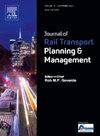移动街区系统的时间表优化
IF 2.6
Q3 TRANSPORTATION
Journal of Rail Transport Planning & Management
Pub Date : 2022-06-01
DOI:10.1016/j.jrtpm.2022.100315
引用次数: 5
摘要
本文提出了一种能够在微观水平上在移动块状态下对列车进行路线和排序的优化模型。基于通用时间表定义(GTTP),允许插入任意详细的方法来计算运行时间和车头时距,我们描述了一种使用速度展开的分层图方法,并开发了混合整数线性规划公式。最后,我们给出了一个混合交通的德国走廊场景的有希望的结果,表明将分支切断应用到我们的模型中可以解决合理规模的实例,最多有100列火车达到最优。本文章由计算机程序翻译,如有差异,请以英文原文为准。
Timetable optimization for a moving block system
We present an optimization model which is capable of routing and ordering trains on a microscopic level under a moving block regime. Based on a general timetabling definition (GTTP) that allows the plug in of arbitrarily detailed methods to compute running and headway times, we describe a layered graph approach using velocity expansion, and develop a mixed integer linear programming formulation. Finally, we present promising results for a German corridor scenario with mixed traffic, indicating that applying branch-and-cut to our model can solve reasonably sized instances with up to a hundred trains to optimality.
求助全文
通过发布文献求助,成功后即可免费获取论文全文。
去求助
来源期刊

Journal of Rail Transport Planning & Management
TRANSPORTATION-
CiteScore
7.10
自引率
8.10%
发文量
41
 求助内容:
求助内容: 应助结果提醒方式:
应助结果提醒方式:


